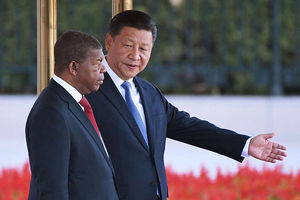
Foreign Affairs Principal Secretary Korir Sing’oei.
Kenya says it will select international partners without looking East or West in what it believes is a workable strategy of pragmatism while learning on the job.
And as Nairobi prepares to launch its revised foreign policy today (December 2, 2024), the Ministry of Foreign Affairs and Diaspora sought to answer the age-old question: Will Kenya face West or East? Except there won't be a choice, according to Foreign Affairs Principal Secretary Korir Sing'oei.
In an interview with Nation.Africa on Friday, Dr Sing'oei said Kenya would avoid taking sides, a cautious approach to avoid alienating partners who could come through in various capacities.
“Where we are is something that I have described elsewhere as an interregnum. We are sort of in a transition globally where what will be is yet to crystalise. The shape of global organs that will emerge from the current rupture and disruption is not yet clear,” he told Nation.Africa.
“It is a bit disingenuous on our part to suggest that we are facing in a particular direction. We are in a zone where we need to be adaptive in order to protect our interests.
“It's very dangerous to be aligned one way or the other because there will be immense shifts over the next 10 years. The last 10 years have been quite dramatic and we believe that the next 10 years are going to be even more dramatic,” Dr Sing'oei said
Geopolitical rivalry
Kenya’s view, he argued, is that the world is becoming sort of ‘plurilateral’, breaking from the traditional East-vs-West kind of geopolitical rivalry. Plurilateralism will mean adopting ‘a shared interest among a limited number of countries’ suggesting that Nairobi will pursue common interests without regard to region.
The question of East or West is something Nairobi has answered before, but critics argued it reflected vagueness on Kenya’s part, supposedly avoiding to play the blocs. In May this year, President William Ruto, for instance, argued, Kenya will not be drawn into the geopolitical rivalry.
“People want to pull us into a conversation on whether we are facing East or we are facing West. We are neither facing West nor East, we are facing forward where opportunities are,” Ruto told CNN in an interview while on a State Visit to Washington.
The Foreign Policy to be launched today revises the 2014 document, increasing focus areas to seven from the current five pillars. It now includes peace and security, cultural diplomacy, environment, climate change, blue economy, health, economic diplomacy and digital diplomacy.
“So if you look at the policy, there are is some adaptability to allow for us to be able to take pragmatic decisions, and to take advantage of emerging opportunities without being caught in the polarities, which to our minds, are actually transient,” Dr Sing’oei said.
“There is no certainty that they will remain the way they appear. And that's why you will see in the policy a conversation around what we are calling plurilateralism; looking at formations that are nascent, even though some pluralaterals have existed for a long time, like the Non-Aligned movement, which is not a geographic formation, it's actually an interest based grouping.
“We foresee more interest-based groupings rather than geographic groupings, and we will be looking out for what type of these interest groupings align most with our strategic interests. At this point in time, the policy is actually trying to avoid being prescriptive and setting down principles that can illuminate the strategic direction that we should be able to take as and when we need to take it.”
Exclusive club
Accused of being an exclusive club, Kenya’s Foreign Affairs ministry says the policy is a response to “a much more assertive population that's asking questions about several foreign policy decisions.”
It says the policy will open up to other government agencies to play a role in pursuing the country’s national interests. These interests include Kenya’s territorial integrity, sovereignty and security; political stability and economic prosperity, constitutionalism and rule of law, national values and principles of good governance, environmental sustainability and climate action, strategic leadership and global collaboration, peaceful co-existence with neighbours, peaceful resolution of conflicts and thought leadership on international stage.
The policy is to be followed by a sessional white paper which will, for the first time, discuss Kenya’s resource allocation to implement the focus areas of the foreign policy. But it will also mean the job requirements for those to be hired in the Foreign Service will expand beyond the traditional roles of diplomats, traditionally experts in international relations or related fields. One area may include revising the Foreign Service Act, the definitive law that provides for recruitment and structure of the Foreign Ministry, to widen the scope of experts there.
“Diplomacy is changing, because what used to be the forte of diplomats is shifting. We never thought technology would be a big global governance issue, but it is,” Dr Sing’oei said.
“We are no longer looking just for diplomats from your usual catchment area, you know, guys who studied international relations, and that appeared to be the only pathway you could become a diplomat. As a matter of fact, I think because of the complexities we're talking about, you're looking for people with broader knowledge, broader understanding of the world. And there has to be an investment then on building that capacity and capability,” he added.







